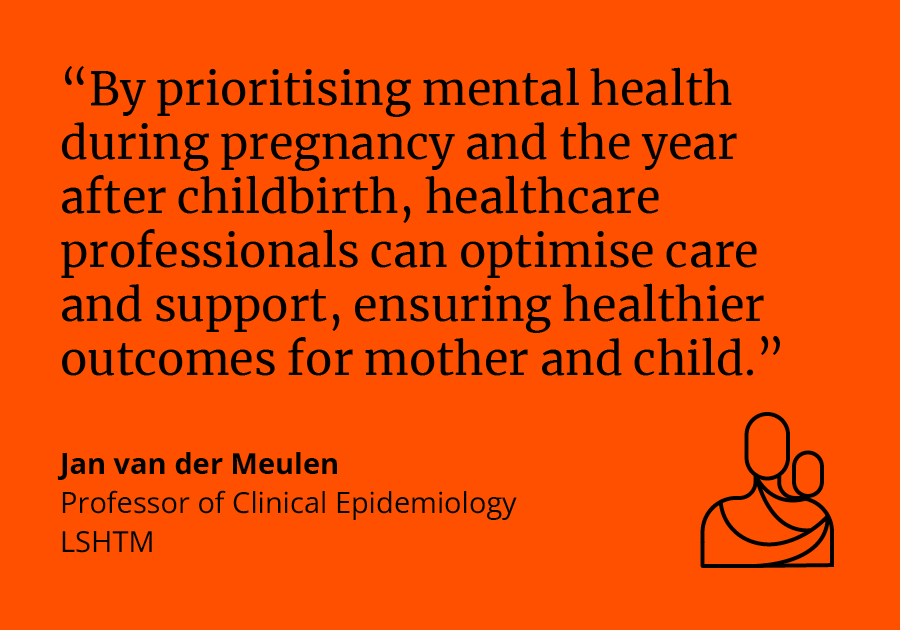
The risk of premature birth is up to 50% higher in pregnant women who have had at least one contact with specialist mental health services compared to those who have had no contact, according to research published in Lancet Psychiatry.
The risk of having a baby too small for gestational age and the risk of health problems for the baby such as underdeveloped lungs and bleeding into the brain, is also increased by 34%.
The research team was co-led by the London School of Hygiene & Tropical Medicine (LSHTM) and the University of Exeter and included researchers from King’s College London, The Royal College of Obstetricians and Gynaecologists, St George’s University of London, De Montfort University, the University of Liverpool and the University of Sydney.
Dr Ipek Gurol-Urganci, Associate Professor at LSHTM who co-led the study, said: “This study in two million women who gave birth in England shows the importance of asking women who are planning a pregnancy or who have recently learned they are pregnant whether they have ever had contact with specialist mental health-care services. Questions about the highest level of care (in other words, was it an admission to a psychiatric hospital, involvement of a crisis resolution team, or specialist community care) and the timing of the most recent contact help to identify women at the highest risk.”
The study analysed data from over two million pregnant women in England and found that 1 in 14 women included had at least one face-to-face contact with specialist mental health care pre-pregnancy, equating to 7.3% or 151,770 women. For these women, the risks of preterm birth and giving birth to a baby too small for gestational age were increased, even if the contact had been more than five years before pregnancy.
The research team found that the risk of preterm birth increased according to the level of health care contact, with women previously admitted to a psychiatric hospital facing a 50% greater risk.
The risk of premature birth also increased according to the timing of contact by 77% in women with a contact less than one year before pregnancy.
The researchers compared the risks of adverse pregnancy and neonatal outcomes and maternal morbidity (suffering from a disease or medical condition) between women with and without a history of mental illness (defined as a care episode with secondary mental health services before pregnancy). The pregnancy and neonatal outcomes included were stillbirth or neonatal death within seven days of birth, preterm birth (before 37 full weeks gestation), and birth of a baby born too small for gestational age.
Women were included in the study if they gave birth to a single baby within the National Health Service (NHS) between 2014 and 2018. Data were collected from Hospital Episode Statistics and Personal Demographics Service birth notifications.
While it is recommended that pregnant women in the UK who have a history of moderate-to-severe mental illness are referred to specialist perinatal mental health services, until now there has been little evidence on the prevalence of mental illness prior to pregnancy. Information about the level and timing of pre-pregnancy mental health care can aid the identification of women at increased risk of adverse outcomes. These findings can be used to develop targeted care packages ensuring that affected women receive appropriate and effective support throughout pregnancy.
Jan van der Meulen, Professor of Clinical Epidemiology at LSHTM who contributed to the study said: “This study demonstrates the value of linking NHS datasets. Improving the accuracy and completeness of national data on mental health services and maternity care is a key priority. NHS England should improve access to up-to-date data so that research can guide and monitor initiatives to improve perinatal mental health services.
“As healthcare continues to evolve, evidence-based decision-making becomes increasingly crucial. This study's robust findings pave the way for better risk assessment, improved prevention efforts, and tailored treatments, ultimately enhancing the well-being of expectant mothers and their babies. By prioritising mental health during pregnancy and in the year after childbirth, healthcare professionals can optimise care and support for women, ensuring healthier outcomes for both mother and child.”
Our postgraduate taught courses provide health practitioners, clinicians, policy-makers, scientists and recent graduates with a world-class qualification in public and global health.
If you are coming to LSHTM to study a distance learning programme (PG Cert, PG Dip, MSc or individual modules) starting in 2024, you may be eligible for a 5% discount on your tuition fees.
These fee reduction schemes are available for a limited time only.
